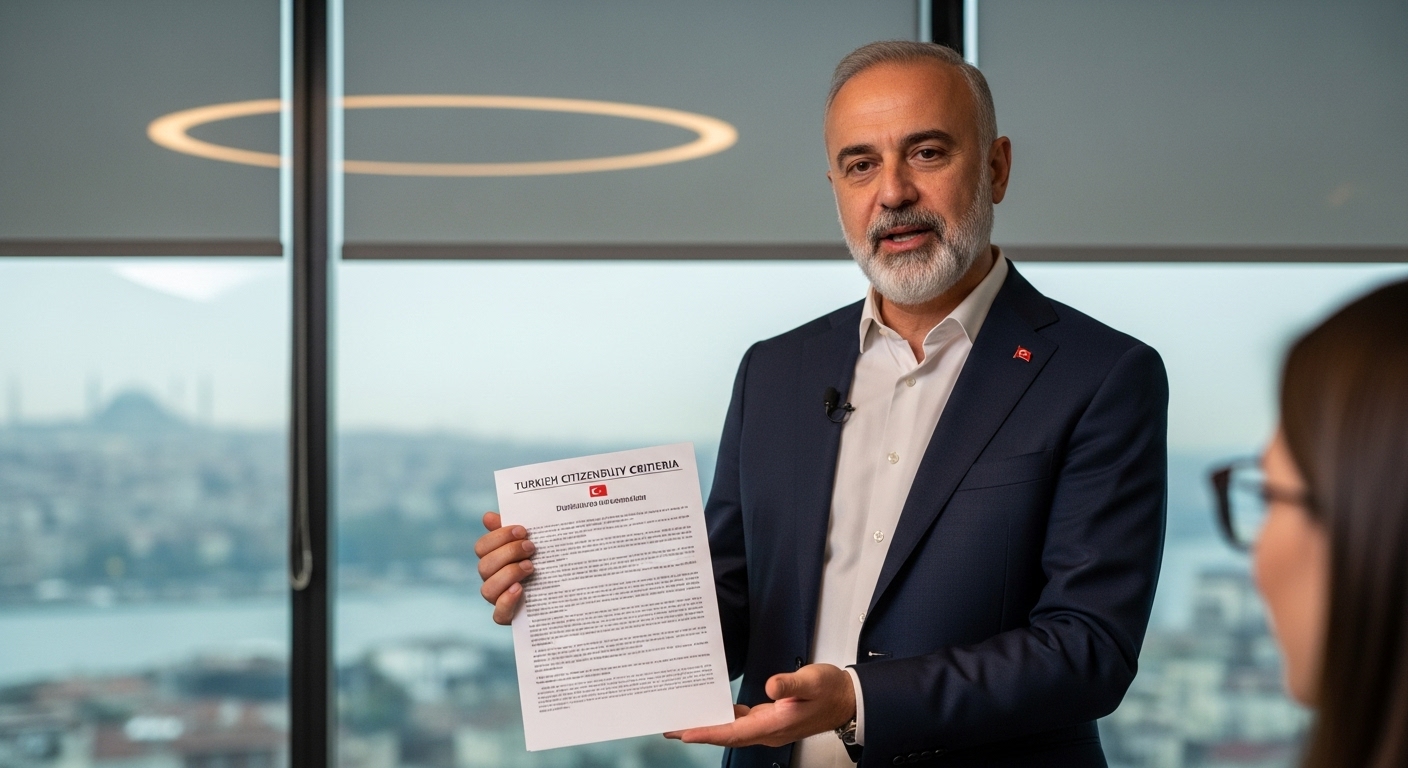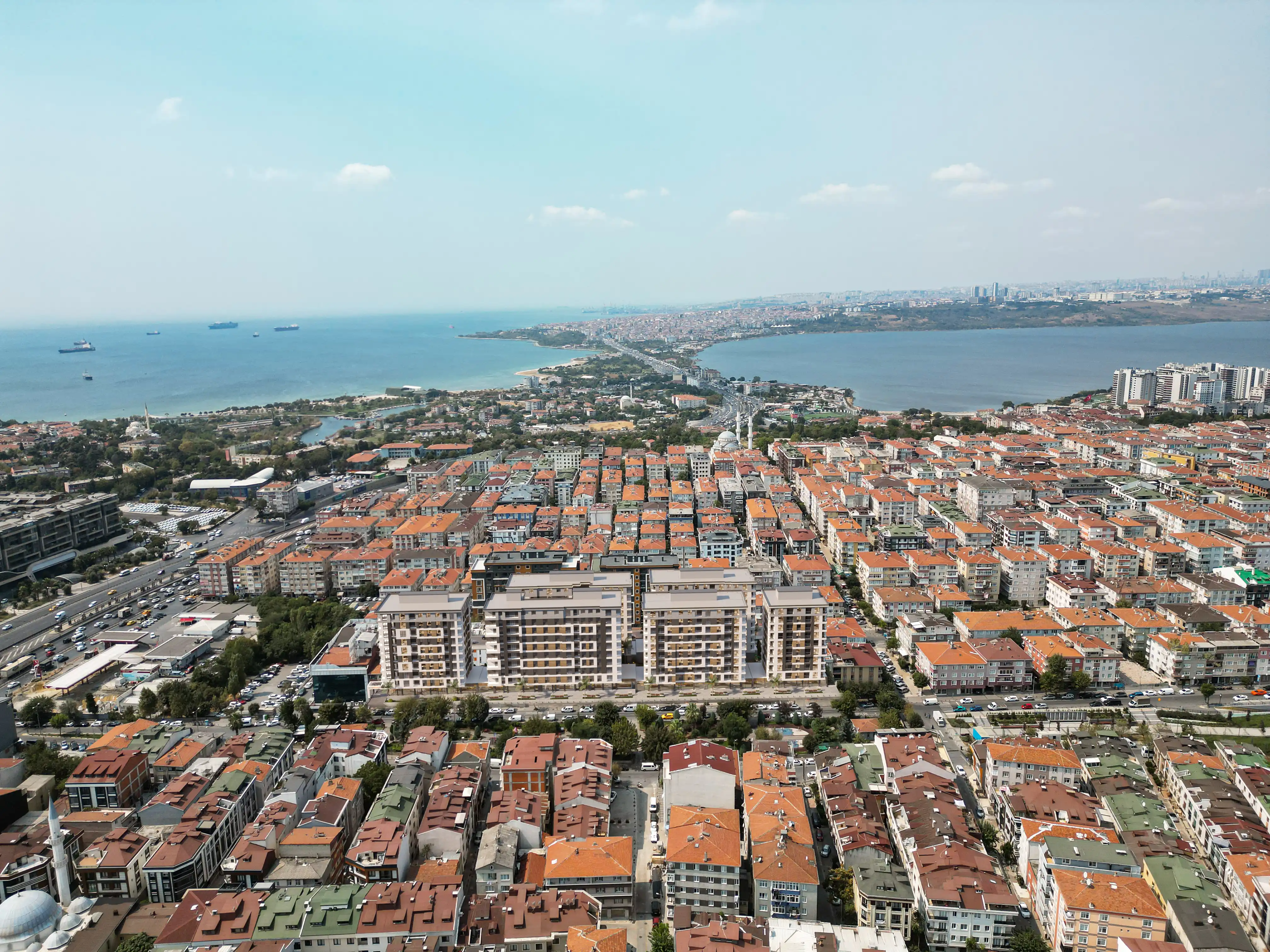Turkish Citizenship Eligibility Criteria: Complete Guide 2025
Discover all the up-to-date Turkish citizenship eligibility criteria, step-by-step paths, and practical tips to get your Turkish passport fast and legally.

Introduction
Turkey, straddling Europe and Asia, is not just a popular tourist destination but also an increasingly attractive place to live, invest, and do business. Over the past decade, thousands of foreigners have shown interest in acquiring Turkish citizenship, driven by the promise of a vibrant lifestyle, strategic location, and strong passport benefits. But what does it actually take to become a citizen of Turkey? In this comprehensive guide, you’ll discover every aspect of Turkish citizenship eligibility criteria, the routes you can take, and practical advice to help you navigate the process smoothly.
Many people see Turkish citizenship as a gateway to economic opportunities and a more flexible lifestyle. Whether you’re an investor, a professional looking to relocate, or someone married to a Turkish national, understanding the rules and requirements is crucial. So, buckle up as we break down each path in detail, ensuring you know exactly what to expect before you make your move.
Basic Eligibility Requirements
Before diving into the specific paths to citizenship, it’s important to know the basic criteria that apply to most applicants. First and foremost, you must be of legal adult age, which in Turkey is 18 years old. This requirement is straightforward but non-negotiable—no exceptions.
Next up is the residency condition. Typically, if you’re not applying through investment or marriage, you need to have legally resided in Turkey for at least five consecutive years with a valid residence permit. You should not have stayed outside Turkey for more than six months during this period; otherwise, your residency period might reset. Authorities expect you to demonstrate integration into Turkish society—speaking basic Turkish, understanding cultural norms, and having no criminal record are part of this expectation.
In addition to age and residency, your income and financial stability matter. Applicants must prove they can support themselves and their dependents without becoming a burden on the state. Bank statements, employment contracts, or proof of business ownership are typically required.
Health is another box to check. An applicant must not have any diseases that pose a threat to public health. A medical certificate from a recognized Turkish hospital or clinic is often requested.
Finally, a good moral standing is essential. A clean criminal record in both Turkey and your home country is mandatory. Even minor legal issues can delay or derail your application, so it’s wise to handle any outstanding legal matters before applying.
Understanding and meeting these baseline requirements sets you on the right track. Next, let’s break down the specific routes you can take—starting with the simplest one: acquiring citizenship by birth.
Acquiring Turkish Citizenship by Birth
For some people, Turkish citizenship is automatic from the moment they take their first breath. Turkish law recognizes two main ways this can happen: by descent (jus sanguinis) or by place of birth under special circumstances.
Citizenship by Descent:
If either of your parents is a Turkish citizen, you’re eligible for Turkish citizenship by birth, regardless of where you were born. This rule makes it easy for Turkish families living abroad to pass citizenship to their children without any bureaucratic hurdles. All that’s usually needed is registration of the child’s birth at the nearest Turkish consulate.
Citizenship by Place of Birth:
In rare cases, a child born in Turkey to foreign parents might acquire Turkish citizenship if the child would otherwise be stateless. For example, if the parents’ nationality doesn’t automatically pass to the child under their home country’s laws, Turkey may grant citizenship to prevent statelessness.
It’s important for families to register the birth promptly. Failure to do so can lead to delays or complications later, especially when the child needs a passport or national ID. So, if you’re a Turkish parent living overseas, make that consulate visit a priority!
Acquiring Turkish Citizenship by Marriage
Marriage to a Turkish citizen is one of the most common routes to gaining Turkish citizenship. However, it’s not automatic—Turkey takes steps to prevent sham marriages aimed solely at acquiring citizenship.
Marriage Duration Requirement:
The general rule is simple: you must have been married to a Turkish citizen for at least three years before you can apply. During this period, you must live together genuinely as a couple, which authorities may verify through interviews, home visits, or document checks. If you divorce before completing three years, your chance to apply vanishes unless you can prove the marriage was genuine and ended due to exceptional circumstances like domestic violence.
Conditions and Restrictions:
Applicants must show they have no activities incompatible with family unity—basically, you should have a stable, normal married life without criminal issues or threats to public security. If your spouse dies after three years of marriage but before your application, you can still apply for citizenship, provided the marriage was genuine.
It’s wise for couples to maintain proper records: joint bank accounts, shared bills, and photos can all help demonstrate a real relationship. Authorities are trained to spot fake marriages, so honesty is your best policy.
Acquiring Turkish Citizenship by Investment
One of the most talked-about pathways is the Turkish Citizenship by Investment Program. This option attracts thousands of high-net-worth individuals each year, thanks to its clear process and relatively low investment threshold compared to similar programs worldwide.
Minimum Investment Options:
As of now, the minimum investment requirement starts at USD 400,000 for purchasing real estate. Alternatively, you can deposit at least USD 500,000 in a Turkish bank or make a similar amount of fixed capital investment in a Turkish company.
Real Estate Investment Route:
Most investors choose the real estate path because it’s straightforward and potentially profitable. You can buy residential or commercial property worth at least USD 400,000, provided you hold onto it for at least three years. The property must be registered without any mortgages or liens.
Bank Deposit Route:
Another popular option is to deposit USD 500,000 or more in a Turkish bank and keep it there for at least three years. This route appeals to investors who prefer liquidity or don’t want to deal with property management.
These investment paths also allow you to include your spouse and dependent children under 18 in the same application, making it a family-friendly option.
Acquiring Turkish Citizenship by Naturalization
For many expats and long-term residents, naturalization is the classic route to becoming a Turkish citizen. Unlike citizenship by birth, marriage, or investment, naturalization requires you to genuinely live in Turkey and integrate into society over several years.
General Requirements for Naturalization:
The baseline for naturalization is simple but firm: you must have legally resided in Turkey for at least five continuous years right before your application. Interruptions longer than six months can break this continuity and may force you to restart the clock. During this period, you must hold a valid residence permit for work, study, or other lawful purposes—not just a tourist visa.
Additionally, you must demonstrate sufficient knowledge of the Turkish language. While fluency is not mandatory, you should be able to converse and handle everyday tasks in Turkish. This is usually verified through an informal interview rather than a formal test, but applicants often feel more confident after taking basic Turkish courses.
Another condition is showing good conduct. Any criminal record or legal trouble—especially offenses involving national security or moral turpitude—will likely result in a rejection. Immigration officers also assess whether you pose any threat to public order.
Lastly, you must prove you have enough income or resources to support yourself and any dependents. A stable job, pension, savings, or business income are all acceptable proofs. Some provinces may require a local guarantor to confirm your financial stability.
Required Documentation:
Paperwork is a big part of naturalization. You’ll need to provide:
A valid residence permit.
Proof of continuous residence (like rental contracts, utility bills, or address registration).
A clean criminal record from both Turkey and your home country.
Medical certificate from an authorized Turkish hospital.
Proof of financial means (bank statements, employment contract, tax returns).
Marriage certificate and children’s birth certificates if you’re including family members.
The final step involves an interview with immigration officials, who check your language skills and verify your integration into Turkish life. If all goes well, your file moves to the Ministry of Interior for approval—a process that can take several months.
Exceptional Citizenship
Turkey also grants citizenship in special cases where an individual’s skills or contributions benefit the nation significantly. This is sometimes referred to as “exceptional citizenship” and is less common but still important.
Citizenship Granted for Special Services:
If you have extraordinary talents in science, technology, culture, arts, or sports, you may qualify for citizenship on these grounds. Well-known examples include international athletes recruited to compete for Turkish teams or scientists working on government-sponsored projects.
Citizenship for Foreigners Providing Economic Contributions:
Beyond the standard investment routes, the government may grant citizenship to foreigners who make exceptional contributions to the economy—such as large-scale job creation, technology transfer, or major infrastructure investments. Unlike the structured investment program, this is discretionary and typically requires backing from relevant ministries or government agencies.
This pathway doesn’t follow a rigid checklist; it’s granted case-by-case and often involves high-level government approvals. Applicants pursuing this option usually work closely with lawyers and local advisors to prepare a compelling case for their contribution to Turkey.
Dual Citizenship in Turkey
A common question is whether you can keep your original nationality after becoming a Turkish citizen. The good news? Turkey generally allows dual citizenship, but you need to check if your home country does too.
Is Dual Citizenship Allowed?
Under Turkish law, dual citizenship is permissible. This means you don’t have to renounce your current nationality when you acquire a Turkish passport. However, some countries (like India or China) don’t permit their citizens to hold multiple nationalities. So, before starting the process, check your country’s stance on dual citizenship to avoid surprises.
Implications of Holding Multiple Passports:
Dual citizenship brings advantages and responsibilities. You can enjoy the benefits of living, working, and doing business in both countries. But it may also mean fulfilling tax obligations or military service requirements in both jurisdictions. For example, male dual citizens under certain ages may still be required to serve in the Turkish military, although exemptions and paid discharge options exist.
When traveling, use your Turkish passport to enter and exit Turkey. Use your other passport for your other country of citizenship to avoid visa hassles and potential fines.
Revocation of Turkish Citizenship
While acquiring Turkish citizenship is generally straightforward for eligible applicants, it’s also important to know that it’s not necessarily permanent if you violate certain laws.
Reasons for Revocation:
Turkish authorities can revoke citizenship for serious offenses such as:
Providing false information or fake documents during the application.
Serving in a foreign military without permission.
Activities deemed a threat to national security or linked to terrorism.
Additionally, a citizen can voluntarily renounce Turkish citizenship if they wish to take up another nationality that doesn’t allow dual citizenship.
Legal Procedures:
Revocation isn’t instant. The process includes investigations, official notifications, and a chance for the citizen to appeal. Legal representation is highly recommended in such cases to protect your rights and challenge unfair revocations.
Maintaining good standing, obeying Turkish laws, and keeping your information up to date with local authorities can help you avoid any issues down the road.
Benefits of Holding Turkish Citizenship
Once you become a Turkish citizen, a range of perks open up that go far beyond holding a red passport.
Visa-Free Travel:
A Turkish passport grants visa-free or visa-on-arrival access to more than 110 countries, including Japan, South Korea, Singapore, and many Latin American nations. While EU visa-free travel is not yet available, negotiations continue to improve this aspect.
Access to Healthcare and Education:
As a Turkish citizen, you and your family can benefit from the country’s robust public healthcare system at significantly reduced costs. You also gain access to public schools and universities, many of which offer high-quality education at lower fees than foreign students would pay.
Business and Property Ownership:
Citizenship removes certain restrictions that apply to foreigners. You can freely buy agricultural land, invest in restricted zones, and participate in business tenders reserved for Turkish nationals. Many businesspeople find this particularly advantageous for expanding their operations within Turkey.
Moreover, with citizenship, you can vote in elections and fully participate in Turkey’s political life—a privilege many expats appreciate after years of residency.
Common Mistakes to Avoid During Application
Applying for Turkish citizenship can be straightforward if you do your homework, but countless applicants fall into avoidable traps. Let’s break down some of the most frequent mistakes people make and how you can steer clear of them.
Incomplete Documentation:
One of the biggest reasons for delays and rejections is missing paperwork. Turkish bureaucracy can be strict—an expired document, a missing signature, or an overlooked stamp can push your file to the bottom of the pile. Always double-check the official list of required documents, and whenever possible, have a local consultant or attorney review your application package before submission.
Another related blunder is not translating documents properly. Any foreign documents must be officially translated into Turkish and notarized. Many embassies and consulates provide these services, or you can use authorized translators in Turkey. Never assume English versions will suffice.
Misrepresentation of Facts:
Some applicants think small lies or omissions won’t be noticed. Wrong! Turkish immigration authorities cross-check details with various government databases and your home country’s records. Hiding a criminal record, forging bank statements, or lying about residency history can lead not just to rejection but also to permanent blacklisting.
Even exaggerations—like inflating your Turkish language ability—can backfire during interviews. Officers can switch to Turkish mid-conversation to test you on the spot. If you struggle, it raises red flags.
Overstaying or Violating Visa Conditions:
Some hopeful applicants assume that staying in Turkey on an expired visa will somehow help prove “long-term residence.” In reality, overstaying or working illegally can damage your record and might lead to deportation instead of citizenship.
Always maintain valid legal status—whether that’s through a residence permit, work visa, or student permit—during your residency period.
Ignoring Local Requirements:
Different provinces can interpret the rules slightly differently. For example, residency requirements might be stricter in major cities like Istanbul or Ankara compared to smaller towns. Some local offices ask for extra proof of language skills or community ties. Consulting a local expert ensures you meet both national and local expectations.
By avoiding these pitfalls, you boost your chances of smooth approval and spare yourself the headache of costly appeals or repeated applications.
How to Apply for Turkish Citizenship
Now that you know the eligibility requirements, let’s tackle the “how.” The Turkish citizenship application process is structured but can feel overwhelming without a roadmap. Here’s a clear, step-by-step breakdown.
Step-by-Step Application Process:
Confirm Your Eligibility:
Before doing anything, ensure you meet the specific conditions for your chosen route (birth, marriage, investment, or naturalization). Get your supporting documents ready.
Collect Required Documents:
Prepare originals and notarized Turkish translations. Common documents include:
Valid passport
Residence permit
Proof of address
Criminal record certificate
Marriage/birth certificates (if applicable)
Medical certificate
Proof of income or investment
Visit Local Population Directorate:
File your application at the Provincial Directorate of Population and Citizenship Affairs (Nüfus ve Vatandaşlık İşleri Genel Müdürlüğü). Officers will check your paperwork and conduct an initial interview.
Undergo Security and Background Checks:
After submission, the Ministry of Interior coordinates checks with national security agencies to verify your background. This can take a few months.
Wait for Approval:
Once security checks are clear, your file moves to the Presidential Office for final sign-off. The decision is published in the Official Gazette.
Receive Your Turkish ID and Passport:
If approved, you’ll be invited to collect your national ID card and apply for your first Turkish passport.
Where to Submit Applications:
Applications must be filed in person in Turkey or at Turkish consulates abroad (for birth and descent cases). Some steps, like document verification, might still require a local visit.
Hiring an experienced immigration lawyer can speed up the process and minimize surprises. While it’s optional, many applicants consider it worth the peace of mind.
Processing Time and Costs
Let’s face it—everyone wants to know: how long does it take, and how much will it cost? Here’s what to expect.
Average Timeline:
The entire process usually takes between 6 months to 2 years, depending on the citizenship route.
By birth or descent: 1–3 months (if documents are complete).
By marriage or naturalization: 12–24 months.
By investment: Typically the fastest, often completed in 3–6 months if your investment is clear-cut and all paperwork is in order.
Delays can occur if your background check raises questions, if you submit incomplete documents, or if there’s a sudden backlog at the immigration office.
Fees and Hidden Costs:
Official processing fees are relatively low—generally under $500 USD for administrative charges. However, other costs add up quickly:
Translation and notarization of documents.
Legal consultation fees (optional but recommended for complex cases).
Real estate agent commissions if buying property.
Bank fees for large transfers.
Applicants using the investment route must also factor in taxes, property registration costs, and possible currency fluctuations when transferring funds.
Always budget extra time and money for unforeseen hiccups—having a cushion reduces stress.
Tips for a Successful Application
After handling thousands of citizenship files, lawyers and consultants agree: a few smart moves can make or break your application.
Hiring a Local Attorney:
Although not mandatory, a Turkish immigration lawyer is a lifesaver for complex cases. They know the local officials, stay up to date with changing laws, and can resolve unexpected issues faster than you can alone. For investment citizenship, a lawyer ensures your property or deposit fully complies with the law—protecting your money and your status.
Staying Compliant with Turkish Laws:
Maintain a clean record. Keep your address registration up to date with your local municipality. Pay taxes on time and avoid overstaying or working illegally. These small acts build a spotless profile, increasing your chances of approval.
Keep Copies of Everything:
Every residence permit, utility bill, rental agreement, or bank slip might be useful. Save digital backups and organize paper copies neatly—you never know when an officer might request something unexpectedly.
Integrate Into Local Life:
Join community events, learn Turkish, and make local friends. It’s not just about paperwork; showing genuine ties to Turkey reassures immigration officials that you’re here for the long haul.
Conclusion
Turkey offers an appealing, flexible path to citizenship for people from all walks of life—whether you’re investing, marrying a local, or settling down long-term. With clear eligibility rules and multiple routes, the process is accessible, provided you do your homework and stay compliant with Turkish laws.
Acquiring Turkish citizenship opens doors to a vibrant lifestyle, booming business opportunities, and greater global mobility. If you think Turkey might be your future home, start planning today. Gather your documents, consult trusted experts, and take that exciting step toward becoming a part of this dynamic country.
For an even more detailed step-by-step walkthrough, check out this Complete Guide to Getting Turkish Citizenship (2025) and learn more about the Turkish Citizenship Program here. These resources offer updated insights, real estate opportunities, and expert tips tailored to help you navigate the process smoothly.
Have Question Or Suggestion ?
Please Share Your Thought, To Make It Real













